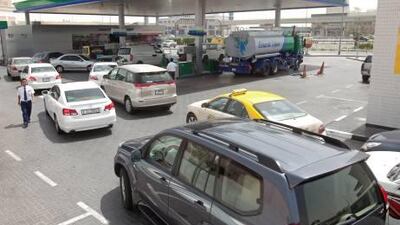DUBAI // A number of petrol stations were facing fuel shortages yesterday after apparently failing to receive fresh supplies.
Customers were turned away from the pumps at several Emarat stations. Workers at some said their tanks had been empty for three days.
It is the second time in eight months that Emarat stations have been hit by shortages.
Last time, in September, Emarat issued a statement blaming "technical problems in the logistics supplies of gasoline product in the major reservoirs" for its failure to deliver.
Of three stations in Al Safa area of Dubai visited by The National yesterday, two lacked any fuel at all and one had only the Special 95 brand.
"We had it delivered this morning at 1am," said an attendant at Al Wasl station on Safa road, who declined to be named.
"The shortages have lasted three days already, but this could hopefully be a sign that the problem is solved."
A spokesman for the company declined to comment.
The shortage left some consumers frustrated. "Luckily I wasn't in a hurry today," said Marco Palma, from Italy. "If I was heading to work it would have been a big problem."
Peter Scriven drove to a nearby Enoc station after being turned away from Emarat's Al Ameen station on Al Wasl road. "I was running on almost empty and I only just made it here," said the Briton. "They should have announced it on the radio."
Emarat has sustained losses in recent years because it has to buy petrol on the international market and sell it at a regulated, lower rate.
It has debts of Dh2 billion, and in January asked the Federal National Council to change the law to let it raise capital from the markets worth up to 50 per cent of its current value.
Until a year ago, petrol prices were capped at Dh1.37 a litre. Since then the Government has allowed it to rise by almost a quarter to Dh1.70 a litre.
Even that is less than it costs on the open market, and unless that changes the company will continue to suffer, according to Samuel Ciszuk, a Middle East energy analyst for the research house IHS Global Insight.
"There needs to be some sort of intervention by the state," he said.
mcroucher@thenational.ae

Motorists turned away as fuel stations run dry in Dubai
Employees say tanks have been empty for three days.
Most popular today
